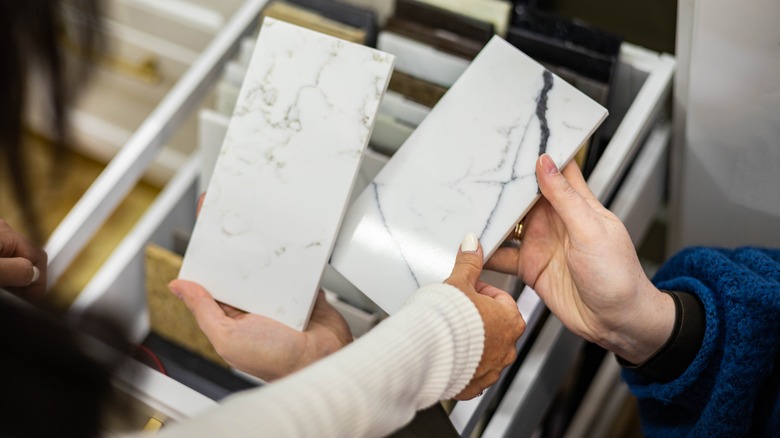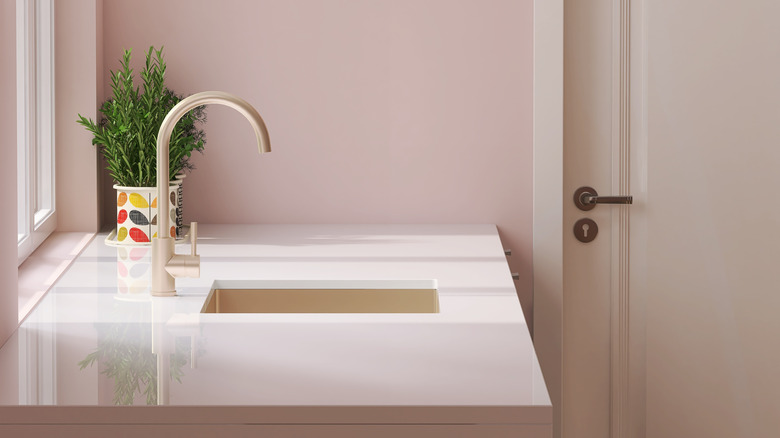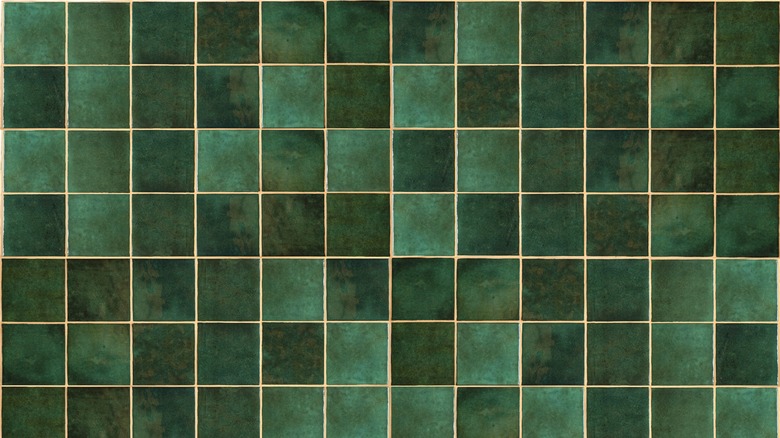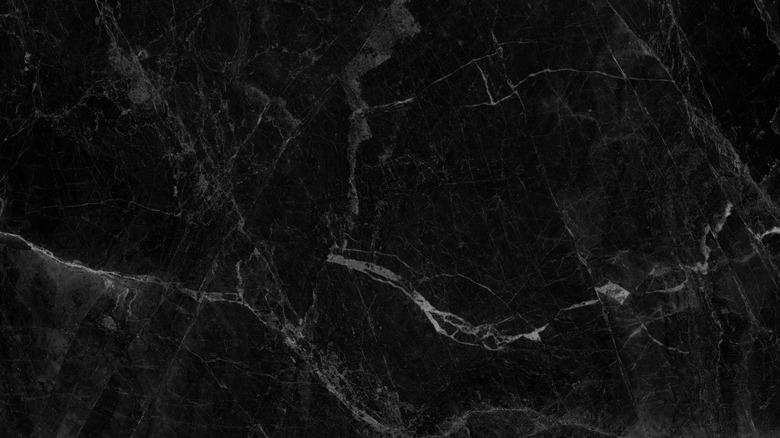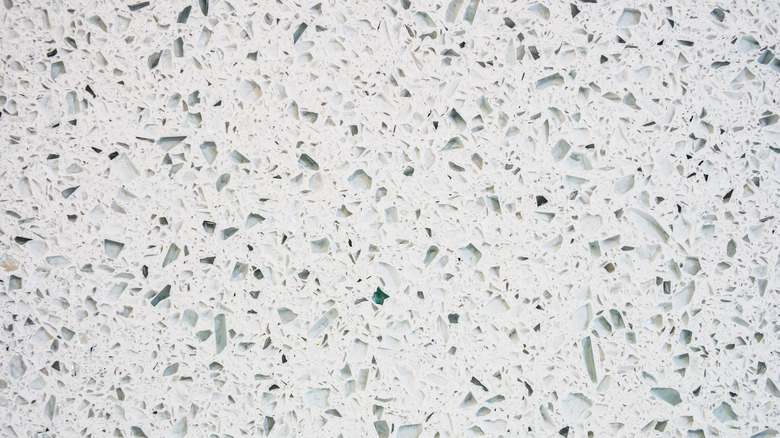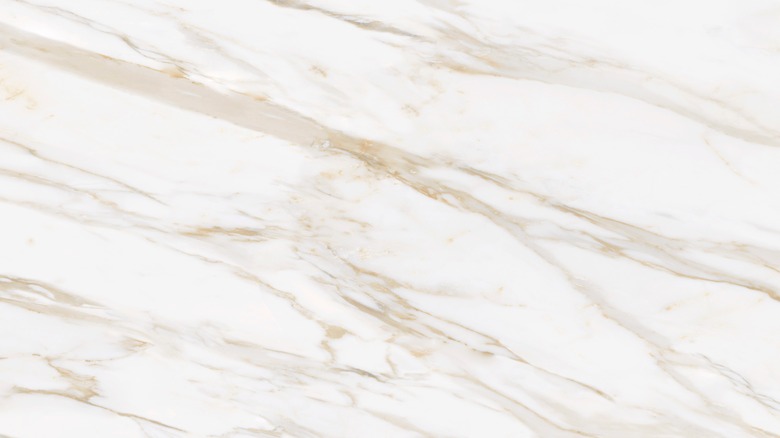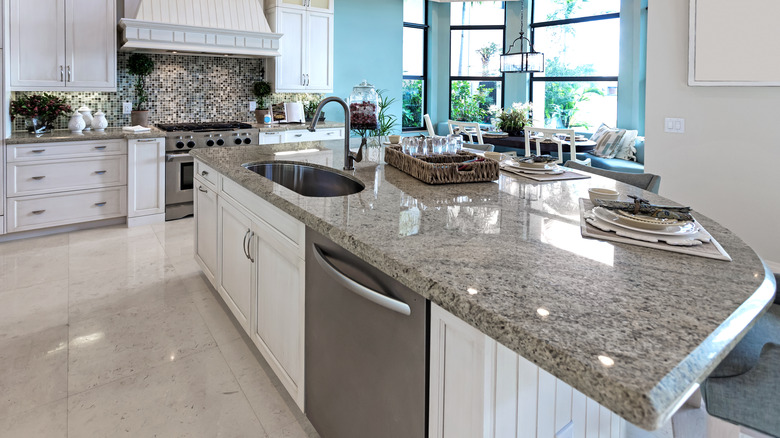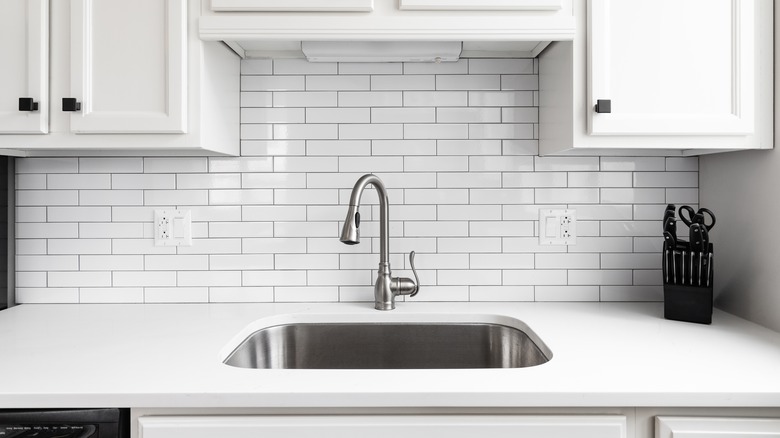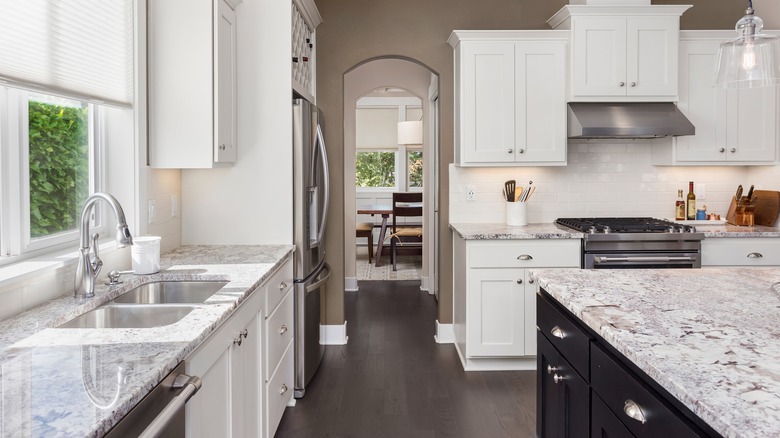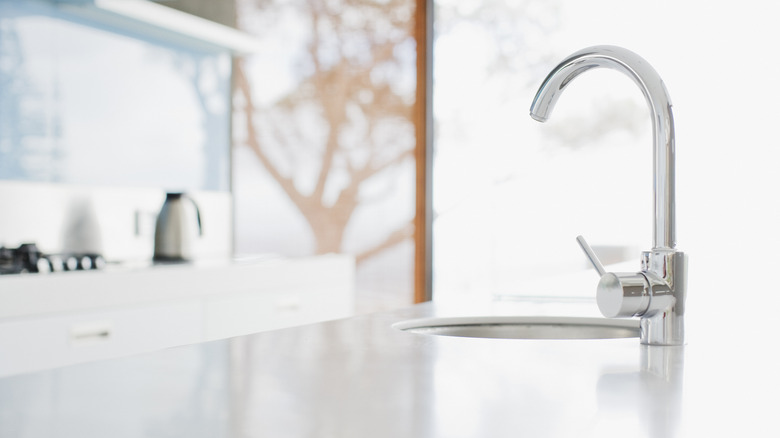8 Beautiful Countertop Materials Ranked By Durability
If you're new to the world of countertops and want to make the best decision for your home, then this article is for you. Choosing the right countertop is one of the most crucial aspects to consider when designing and remodeling your kitchen or bathroom. The countertop takes up significant space, so you'll want to select something that adequately represents your style. However, aesthetics aren't the only factor worth mulling over. Thinking about what you need from your most-used surface is a must before making any decisions. Do you spend a lot of time in your kitchen or bathroom and use the countertop extensively? Are you planning on selling your house in the future? If the answer to those questions is "yes," then durability will be one of the key features to look out for.
While most think of durability as hardness alone, the definition from Oxford Languages states it's "the ability to withstand wear, pressure, or damage." Thus, other key considerations, like heat, crack, and warp resistance, along with the material's porousness, must also be taken into account. We used these five criteria to provide the most accurate ranking for eight of the most popular countertop materials. Ideally, you want a countertop that can withstand as much use as possible while being easy to maintain along the way. We dove deep into researching the data on these crucial aspects and will provide a more in-depth ranking methodology at the end of this article.
8. Laminate
Laminate is a resurfaced countertop style that appeals to homeowners with its ease of installation and surprisingly low cost. But just how durable is laminate? Ranking laminate toughness can be tricky because companies use different processes to make their material. For example, some brands offer high-pressure laminates (HPL), which are more durable than cheaper options. However, generally speaking, laminate averages a hardness scale rating of about 3, meaning it can be somewhat easy to scratch. Additionally, traditional laminates are prone to chipping and heat damage, though HPLs can withstand more heat.
Although laminate countertops aren't the most durable option, they hold up against typical daily kitchen and bathroom use. Yet, that's assuming you're careful not to scratch the surface or put hot items like heated hair tools, or pots and pans, on it. The biggest pros of laminates are their affordability and easy installation. So, while damage is more likely than with other materials, laminate is less expensive and easier to replace. The colors and patterns are nearly endless, so you can easily mimic the appearance of high-end stone designs for a fraction of the cost.
7. Tile
As with many trends, the popular 1920s and '30s countertop is another option that has come back over the past few years. Ceramic tiles start as a mixture of clay, minerals, sand, feldspar, quartz, and water. What was once a hand-crafted material now goes through a pressing process where they are formed, glazed, and baked. You can also opt for other types of tile countertops, like porcelain, which tend to be a bit stronger than ceramic options. In either case, tiles are known for their superior heat resistance, making them a good choice for the kitchen. They're also stain-resistant, though the grout is incredibly porous, so you'll want to wipe up spills that fall between the tiles immediately.
Although ceramics have a wide range on the hardness scale, the main downside is they're all prone to chipping. However, replacing a small damaged tile is easier and more cost-effective than replacing a natural stone slab. Ceramic tiles are a popular choice among homeowners wanting an easily-DIY option. They're also beloved by many because there are a vast number of colors, patterns, and sizes to choose from. Whether you want a minimalist monochromatic look or a vibrant mosaic design, tile can help you achieve the aesthetic you're going for. One main con to consider with tile is the grout maintenance; regular cleaning and grout resealing are necessary to prevent staining.
6. Soapstone
Although soapstone countertops are one of the softest options according to the Mohs Harness Scale, other factors make it a considerable choice. It contains the mineral talc, giving it a soft and smooth texture, causing it to have the lowest hardness rating of 1. However, it's non-porous, so you won't have to worry about staining if you let a spill sit for too long. Soapstone is also one of the most heat-resistant stones available. And because there isn't a sealant, you can place pots and pans directly on the surface without leaving scorch marks or cracking the counter.
Soapstone comes in stunning variegated patterns in shades of gray, blue, green, and brown. Over time, the soapstone naturally darkens and develops a distinct patina. Some homeowners love the effects of its aging process, while others aren't fans of it. As mentioned, the soft material is prone to scratches, though its density keeps it from easily chipping. Ironically, the softness of soapstone also makes it easy to repair. A little light sanding and mineral oil will essentially erase the damaged area. Like porcelain, soapstone is eco-friendly and can be recycled in the future. With proper maintenance, you can enjoy your soapstone countertops for 20 years or longer.
5. Recycled glass
Recycled glass is one of the most eco-friendly options, but how does it rank in terms of durability? Like quartz, these countertops are crafted by combining crushed glass chips with a binding resin or cement-based mix. So, much like its counterpart, the result is a non-porous surface that resists stains and doesn't allow liquids to seep in or bacteria to breed. These counters are also heat-resistant, though they don't do well under extreme temperature changes. As for overall hardness, glass ranks in at 6.5 on the hardness scale. Although durable all-around, recycled glass counters can't compete with natural stones' toughness, and you'll need to avoid heavy impacts to prevent chipping and cracking.
This option is ideal for someone who wants an environmentally friendly and low-maintenance countertop. Not only is the material recyclable, but it's crafted with previously-used glass, so you can feel good knowing you're giving old bottles, windows, etc., a new life. Because of the unique manufacturing process, these surfaces offer a unique mosaic of colors, shapes, and sizes with no two counters looking exactly the same. Additionally, there's virtually no maintenance to keep up with due to the non-porous binding material. Occasionally, wiping them down with a gentle cleanser is all you need to keep them looking as good as new. Recycled glass countertops range in pricing, though they generally fall between the mid and high-end range.
4. Quartzite
Despite the name, quartzite originates from sandstone. Unlike its engineered counterpart, quartz, quartzite is a natural stone that comes directly from the ground. It is incredibly durable, making it a top choice for those wanting an aesthetic look paired with longevity. It ranks alongside quartz and porcelain at a 7 on the hardness scale, so you can fulfill your kitchen duties without worrying about scratching or chipping the surface. It's also heat-resistant, though using something like a trivet for hot pots and pans is a good idea to avoid scorching the sealant.
In addition to quartzite's durability, it's UV-resistant, meaning direct sunlight won't lighten or darken your countertops over time. One con to consider is the required care to keep your counters at their best. Although tough, it is quite porous. You must ensure you promptly wipe up any spills to prevent irreversible staining. Additionally, quartzite countertops are sensitive to acidic substances, so avoid harsh cleaners that could strip the sealant. Because it's a natural stone, you'll be somewhat limited in color and pattern options, with most shades being gray or white. If you're a DIYer, you'll need to skip installing quartzite countertops and let a professional handle it.
3. Granite
Granite countertops remain a timeless choice, with stunning patterns that fit seamlessly into nearly every style. This natural stone is an igneous rock formed by the cooling and solidification of molten magma deep within the Earth's crust. Its composition primarily includes quartz, mica, feldspar, and other minerals, giving it its unique speckled appearance and texture. Not only is it beautiful, but it's incredibly durable. It resists most chips, cracks, and scratches. However, like nearly all countertop materials, it's possible to damage if it's hit with enough pressure. Additionally, it's heat and warp-resistant, so it can handle high temperatures without warping or discoloration. Granite is a 6 to 7 on the Mohs Hardness scale, making it a tough and resilient surface option.
Although granite is one of the hardest natural stones, it doesn't mean it's a maintenance-free choice. The main downside to installing this counter is the maintenance required to keep it in peak condition. Due to its naturally porous nature, you'll need to seal the countertops regularly to ensure they stay stain-resistant. Another downside is that hiding seams in granite can be challenging due to the unique patterns of each slab, though it's not impossible. You'll want to ensure you hire a professional with experience with this stone pattern who will take precise measurements and install it with the textured look in mind. On the plus side, because there are granite quarries worldwide, there are several color and pattern variations.
2. Porcelain
Porcelain offers a blend of resilience and elegance and is a highly durable option crafted from a mixture of white China clay and China stone. Once the materials are combined and heated at high temperatures, the slabs are coated with pigmented glazes, giving you various color options. Like quartz, this strong material comes in at a 7 on the Mohs Hardness Scale, so these counters can withstand everyday wear and tear without damage. However, they can crack if something strikes them with enough pressure, so you may not want to use heavy tools to tenderize meat directly on them. The non-porous surface prevents liquids from seeping in, making them stain-resistant and water-resistant. Rounding off our durability checklist, the manufacturing process also leads to this material being incredibly heat-resistant, which is ideal for busy kitchens.
Porcelain has a unique advantage over other materials: It's environmentally friendly. It's made of 100% natural, raw materials, so you can feel good knowing it's recyclable. The price tag is one of the biggest cons when considering porcelain countertops. Because of the unique manufacturing process and high durability rating, they tend to be more costly than some of the other options. Though, it may be worth it if you have a high-traffic kitchen. In addition to the many pros, porcelain is low-maintenance and never needs resealing. All you need to do to maintain its beauty is clean it with soapy water, and you're good to go.
1. Quartz
Quartz countertops have become one of the most popular choices for kitchens and bathrooms due to their durability and aesthetic appeal. According to the Mohs Hardness Scale, Quartz ranks at a 7, meaning it is one of the hardest minerals you can find. However, this surface is an engineered countertop material that combines the strength of quartz crystals with waterproof resin. This combination offers the best of both worlds: a surface that is dense, non-porous, and resistant to chipping, cracking, and staining. It can also withstand high temperatures and is quite heat resistant. That said, using coasters and other barriers for added protection is always wise.
One of the best attributes quartz offers is its low-maintenance qualities. Some natural stone surfaces, like granite and marble, require regular sealing to prevent etching and staining. Quartz, on the other hand, does not, because this material has a built-in seal. Since you don't need to apply sealers, you'll never have to worry about that spilled red wine seeping in and discoloring your expensive counters. In addition to these benefits, there are several colors and patterns to choose from, so you don't have to sacrifice style for strength. This versatile surface checks all of our durability boxes, so it's no surprise that it's one of the most costly options on the list. On top of the material price, you'll have to hire a contractor, because quartz must be professionally installed.
Ranking methodology
Durability isn't just about the hardness of the countertop material, but its ability to withstand various types of damage. Thus, we narrowed down our ranking based on these five factors: hardness, heat-resistance, crack-resistance, warp-resistance, and stain-resistance. To determine these qualities, we read through several countertop manufacturers' reports, customer reviews and forums, recommendations from industry leaders, and observed durability tests conducted by experts. We also performed in-depth research into the scientific makeup of each countertop material, focusing on how each one addresses the five most important aspects of countertop durability listed above.
Most notably, we referred to the Mohs Hardness Scale as one of the top factors. How much force each countertop material can withstand, the highest temperature it can handle without damage, and the porousness of each surface were also key points of consideration. Lastly, we concluded each counter's pros and cons to offer a well-rounded review. For example, it was worth noting the ease of replacement if damage were to occur, because, for those on a tighter budget, an inexpensive repair holds some weight to the counter's overall longevity.
